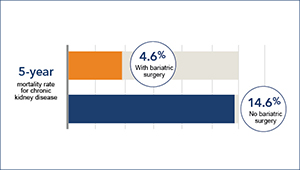Eric A. Johnson, MS
Biography
Eric Johnson, MS, completed the University of Washington’s biostatistics master’s program in 2008. His thesis explored common theoretical problems involved with missing data. He quantified them, highlighting conditions leading to suboptimal performance, and provided new guidelines for using various multiple imputation techniques.
During his time at KPWHRI, Mr. Johnson has been involved with multiple projects involving direct intervention with the care-delivery system, observational studies and microsimulation modeling on colorectal and ovarian cancer, massage therapy, and estimating radiation exposure from medical imaging. His current responsibilities lie in research on obesity, opioids, and mental health.
Before earning his master’s degree, Mr. Johnson worked for four years as a research assistant on the Multi-Ethnic Study of Atherosclerosis (MESA), performing statistical analyses, verifying incoming data, and developing a process for providing data sets to all MESA researchers. Later, he was a research statistician with the Department of Veteran Affairs (VA), serving as the primary analyst in an investigation of how well VA hospitals performed non-cardiac surgeries. Mr. Johnson assessed statistical models used by the National Surgical Quality Improvement Program—then devised, tested, and implemented improved models, reporting his findings to VA leadership.
Research interests and experience
-
Biostatistics
Multiple imputation; prediction models, working with large data
-
Health Systems
Implementing prediction models, and validating that they work as intended. Research into interventions that are financially feasible for health systems to widely implement
-
Cancer
-
Complementary & Integrative Health
-
Health Services & Economics
-
Obesity
-
Mental Health
Recent publications
Simon GE, Shortreed SM, Johnson E, Rossom RC, Lynch FL, Ziebell R, Penfold ARB What health records data are required for accurate prediction of suicidal behavior? 2019 Dec;26(12):1458-1465. doi: 10.1093/jamia/ocz136. PubMed
Coleman KJ, Johnson E, Ahmedani BK, Beck A, Rossom RC, Shortreed SM, Simon GE Predicting Suicide Attempts for Racial and Ethnic Groups of Patients During Routine Clinical Care 2019 Jun;49(3):724-734. doi: 10.1111/sltb.12454. Epub 2018-03-24. PubMed
Smith-Bindman R, Poder L, Johnson E, Miglioretti DL Risk of Malignant Ovarian Cancer Based on Ultrasonography Findings in a Large Unselected Population 2019 Jan;179(1):71-77. doi: 10.1001/jamainternmed.2018.5113. PubMed
Fisher DP, Johnson E, Haneuse S, Arterburn D, Coleman KJ, O'Connor PJ, O'Brien R, Bogart A, Theis MK, Anau J, Schroeder EB, Sidney S Association Between Bariatric Surgery and Macrovascular Disease Outcomes in Patients With Type 2 Diabetes and Severe Obesity 2018 Oct 16;320(15):1570-1582. doi: 10.1001/jama.2018.14619. PubMed
Simon GE, Johnson E, Lawrence JM, Rossom RC, Ahmedani B, Lynch FL, Beck A, Waitzfelder B, Ziebell R, Penfold RB, Shortreed SM Predicting Suicide Attempts and Suicide Deaths Following Outpatient Visits Using Electronic Health Records 2018 Oct;175(10):951-960. doi: 10.1176/appi.ajp.2018.17101167. Epub 2018-05-24. PubMed
O'Brien R, Johnson E, Haneuse S, Coleman KJ, O'Connor PJ, Fisher DP, Sidney S, Bogart A, Theis MK, Anau J, Schroeder EB, Arterburn D Microvascular Outcomes in Patients With Diabetes After Bariatric Surgery Versus Usual Care: A Matched Cohort Study 2018 Sep 4;169(5):300-310. doi: 10.7326/M17-2383. Epub 2018-08-07. PubMed
Elder C, DeBar L, Ritenbaugh C, Dickerson J, Vollmer WM, Deyo RA, Johnson ES, Haas M Comparative Effectiveness of Usual Care With or Without Chiropractic Care in Patients with Recurrent Musculoskeletal Back and Neck Pain 2018 Sep;33(9):1469-1477. doi: 10.1007/s11606-018-4539-y. Epub 2018-06-25. PubMed
Simon GE, Johnson E, Stewart C, Rossom RC, Beck A, Coleman KJ, Waitzfelder B, Penfold R, Operskalski BH, Shortreed SM Does Patient Adherence to Antidepressant Medication Actually Vary Between Physicians? 2018 May;79(3). doi: 10.4088/JCP.16m11324. PubMed
Hsu C, Hertel E, Johnson E, Cahill C, Lozano P, Ross TR, Ehrlich K, Coleman K, BlueSpruce J, Cheadle A, Matthys J, Chapdelaine M, Gray M, Tufte J, Robbins M Evaluation of the Learning to Integrate Neighborhoods and Clinical Care Project: Findings from Implementing a New Lay Role into Primary Care Teams to Address Social Determinants of Health 2018 Jan;22. doi: 10.7812/TPP/18-101. Epub 2018-10-22. PubMed
Hubbard RA, Johnson E, Chubak J, Wernli KJ, Kamineni A, Bogart A, Rutter CM Accounting for misclassification in electronic health records-derived exposures using generalized linear finite mixture models 2017 Jun;17(2):101-112. doi: 10.1007/s10742-016-0149-5. Epub 2016-06-03. PubMed
Research

Study finds bariatric surgery linked to substantially lower risk of blood clots long-term
Largest study to date helps patients weigh risks and benefits of surgery.
New findings

Simpler models to identify suicide risk perform similarly to more complex ones
Models that are easier to explain, use could have better uptake in health care settings.
New findings

Research roundup on natural language processing and machine learning
Using doctor's notes to learn about drug reactions, dementia, and cannabis use.
New findings

Is bariatric surgery helpful in chronic kidney disease?
David Arterburn and colleagues find that bariatric surgery is linked to lower death risk in persons with obesity and CKD.



